|
|
|
Sort Order |
|
|
|
Items / Page
|
|
|
|
|
|
|
| Srl | Item |
| 1 |
ID:
130221
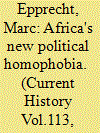

|
|
|
|
|
| Publication |
2014.
|
| Summary/Abstract |
Uganda has a population problem. The United Nations forecasts that the number of people living there will surpass the combined populations of Germany, Italy, and Japan by the end of this century-growing to 205 million in an area about the size of Oregon. It is hard to imagine how this will help with Uganda's
current poverty problem. The nation ranks 161st in the world in the UN's Human Development Index. Having deployed troops in Somalia and South Sudan and suffered terrorist attacks in the capital city, Kampala, Uganda also has a security problem. This partly explains the harassment and repression of the press and civil society groups by a government that is increasingly intolerant of any dissent.
|
|
|
|
|
|
|
|
|
|
|
|
|
|
|
|
| 2 |
ID:
130214
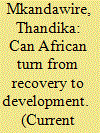

|
|
|
|
|
| Publication |
2014.
|
| Summary/Abstract |
During the last decade or so, Africa, once labeled by the Economist as the "Hopeless Continent," has been rebranded by the same magazine as "Africa Rising." Described by then-British Prime Minister Tony lair in 2001 as "a scar on our consciences," Africa has become the home of "roaring lions" and the "fastest billion"- contrasting with the image of the world's most impoverished "bottom billion," in the words of the economist Paul Collier. These new monikers and the ebullient optimism they reflect are a welcome hange. They have replaced a costly "Afropessimism" that reigned in Western media and academic circles during much of the 1980s and 1990s. The costs of the negative stereotypes of that period were felt not only in terms of Africa's selfesteem but also financially: They depicted Africa as economically much riskier than it ever was and dampened the animal spirits of investors.
|
|
|
|
|
|
|
|
|
|
|
|
|
|
|
|
| 3 |
ID:
130219
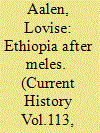

|
|
|
|
|
| Publication |
2014.
|
| Summary/Abstract |
When Meles Zenawi, the national and ruling party leader for 21 years, died in August 2012, most observers predicted that Ethiopia would be thrown into an uncertain transition and put in great danger by
destructive internal power struggles and external pressure. As the months went by, none of these things happened. Instead, the world witnessed a peaceful succession, and a calm status quo has been maintained under the new prime minister, Hailemariam Desalegn.
|
|
|
|
|
|
|
|
|
|
|
|
|
|
|
|
| 4 |
ID:
130218
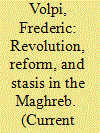

|
|
|
|
|
| Publication |
2014.
|
| Summary/Abstract |
The political situation in the Maghreb in the first decade of the twenty-first century presented a vivid image of enforced stability under authoritarian regimes that gave hardly any hint of changing in the short to medium term. The Moroccan monarchy had successfully engineered a fragmented and ineffective political system that was not posing any concrete challenge to its rule. The military-backed Algerian regime had restored the effectiveness of its institutional apparatus through a combination of repression, diversion of oil rents, and divide-and-rule political tactics. The regime of President Zine el-Abidine Ben Ali in Tunisia had effectively turned into a police state that did not let any kind of organized opposition challenge the established authoritarian "pact." (In Tunisia, this implicit understanding amounted to stability, provision of state services, and opportunities for personal advancement in exchange for political quiescence.)
|
|
|
|
|
|
|
|
|
|
|
|
|
|
|
|
| 5 |
ID:
130220
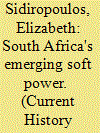

|
|
|
|
|
| Publication |
2014.
|
| Summary/Abstract |
African nations do not often come to mind as primary agents of soft power. Africa's marginalization in the global economy, its own internal conflicts, and the autocratic regimes that ruled many of its countries until the end of the Cold War all limited the cultivation of soft power. Yet the democratization that
swept through the continent in the 1990s sowed the seeds for the current decade's optimistic "African Rising" narrative. Africa is the next frontier of growth, with unsaturated markets, abundant natural resources, and a growing middle class. Once a continent of poverty and war, Africa is now a region of infinite possibilities with many competing suitors. Conflicts persist in places such as the Great Lakes
and the Horn of Africa, but many states boast strong economic growth, albeit with slow improvement
in living standards.
|
|
|
|
|
|
|
|
|
|
|
|
|
|
|
|
| 6 |
ID:
130215
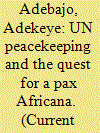

|
|
|
|
|
| Publication |
2014.
|
| Summary/Abstract |
The Kenyan scholar Ali Mazrui presented the idea of a "Pax Africana" in a seminal 1967 study, arguing that Africans should muster the will to create and consolidate peace on their own continent. Mazrui wrote in the aftermath of the Congo crisis of 1960-64, when the United Nations was struggling to keep peace amid a traumatic civil war. The fact that the world body still struggles with peacekeeping in the same country, four decades later, is an eloquent metaphor for the arduous and continuing quest for a Pax Africana. Peacekeeping efforts in Africa are often portrayed in Manichean terms. They are either spectacular "successes," as with the short-term victory of a 3,000-strong Southern African Development
Community (SADC) force that routed the M23 rebels in eastern Congo as part of a UN mission in 2013; or else they are spectacular "failures," as with the current inability of 2,000 French troops and about 6,000 Economic Community of Central African States (ECCAS) peacekeepers-"rehatted" as UN troops-to stop sectarian massacres in the Central African Republic. UN missions in South Sudan (some 8,500 troops) and Sudan's Darfur region (more than 19,000 troops) are also counted as failures.
|
|
|
|
|
|
|
|
|
|
|
|
|
|
|
|
|
|
|
|
|